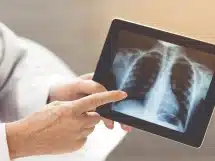A Lancet study found that 44 per cent of cancer deaths in 2020 were preventable. This offers a huge opportunity for India to work towards creating awareness by actively addressing the risk factors.
Over the last 75 years, cancer care in India has evolved tremendously in terms of technological advancements, diagnostics, treatment modalities as well as care facilities. However, there are still certain gaps that need to be addressed. The biggest challenge before us is to improve accessibility to cancer care and diagnostics in order to improve the mortality metrics for this much-dreaded disease.
Studies state that nearly 2.25 million people are living with cancer in India, with around one million new cases and over 8,50,000 deaths reported every year. The National Cancer Registry Programme India estimates that one in nine Indians may suffer from cancer in their lifetime. The most prevalent cancers in the country include breast cancer, lung cancer, oral cancer and cervical cancer.
Early detection
Although cancer is the second leading cause of death globally, many cancers can be cured if detected early. Unfortunately, close to 70 per cent of the cancer cases that are diagnosed in India are already in advanced stages. While there are many reasons for this, we often find that there is a strong stigma associated with the disease. Particularly when it comes to treatment options like chemotherapy and surgery – mostly perpetuated through popular media.
Creating awareness about the disease, adopting preventive measures as well as early detection can go a long way in transforming cancer care in the country. Lifestyle factors, including smoking, tobacco consumption, diet and environmental exposure, are major contributory factors in the increase in the number of cancers occurring before the age of 50.
Reducing exposure to risk factors can help reduce the cancer burden. A Lancet study found that about 44 per cent of cancer deaths in 2020 were preventable. This offers a huge opportunity for India to work towards creating awareness by actively addressing the risk factors, such as obesity, alcohol and tobacco consumption among others. Awareness for health screening should be taken up on a war footing by government as well as institutions (both educational and professional sectors through CSR activities). This can have a huge impact on combating cancer.
Access to care
In India, cancer care and diagnostics are mostly concentrated in tier 1 cities, which means that it is not easily accessible to a majority of Indians. The Central Government’s recent initiative to establish more All-India Institute of Medical Sciences (AIIMS) centres, along with regional cancer centres, can go a long way in tackling the problem of access.
The COVID-19 pandemic and lockdowns led to delayed detection as well access to treatment. However, it also led to a shift to a digital model that facilitates easy accessibility to care. Access to medical professionals virtually via telemedicine and digital healthcare services can truly revolutionise cancer care in the country.
In addition to in-person consultations, hospitals and doctors now offer virtual consultation to patients from the remote corner of India. Healthcare professionals can review critical reports, which have been scanned and sent to them, and further discuss treatment plans with the patient. Cancer care in India can then evolve into a patient-centric approach in the real sense. Also, healthcare sector should emphasis on organ-site focus (speciality-wise focus), wherein treatment can be planned based on clinical research findings, thereby providing the best solution for every patient.
The future is here
The past two decades have seen incredible technological advances in cancer diagnosis, treatment and care. Imaging and surgical techniques have improved substantially as have treatment options for hitherto difficult-to-treat cancers. This, in turn, has boosted the survival rates.
The development of vaccines, especially for cervical cancer, also offers hope. There are ongoing studies for other cancer vaccines and some have entered early-stage clinical trials. It’s too early to celebrate, but the progress is commendable.
For India, the need of the hour is to scale up the healthcare infrastructure in the country to meet the challenges of providing early cancer diagnosis and care. Recently, the National Cancer Grid in India, which is a government-backed network of cancer care and research organisations, established a digital care centre to promote the use of digital technologies for cancer care. This, along with the Parliamentary panel’s recommendation of designating cancer as a notifiable disease, is expected to ensure that cancer treatment and care get much more focussed attention.
The future of cancer care in India holds immense promise. I believe that cell therapy, gene editing, personalised vaccines, microbiome treatments, robotic surgery, as well as the use of artificial intelligence to improve cancer diagnosis and drug developments, will help make cancer a more manageable disease. A disease that is no longer dreaded.
(The author is the Co-Founder and CEO of Cytecare Cancer Hospitals, Bengaluru, India.)
Read More: https://h-leads.com/india-accounts-for-one-third-of-the-global-cervical-cancer-toll/

















